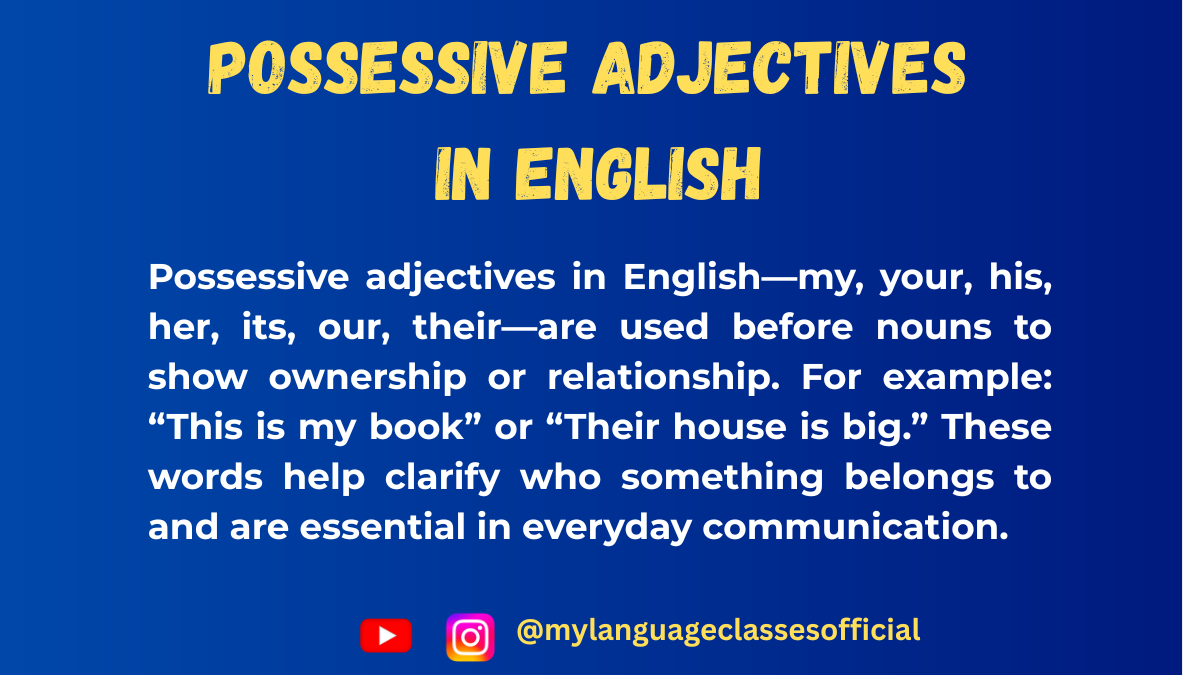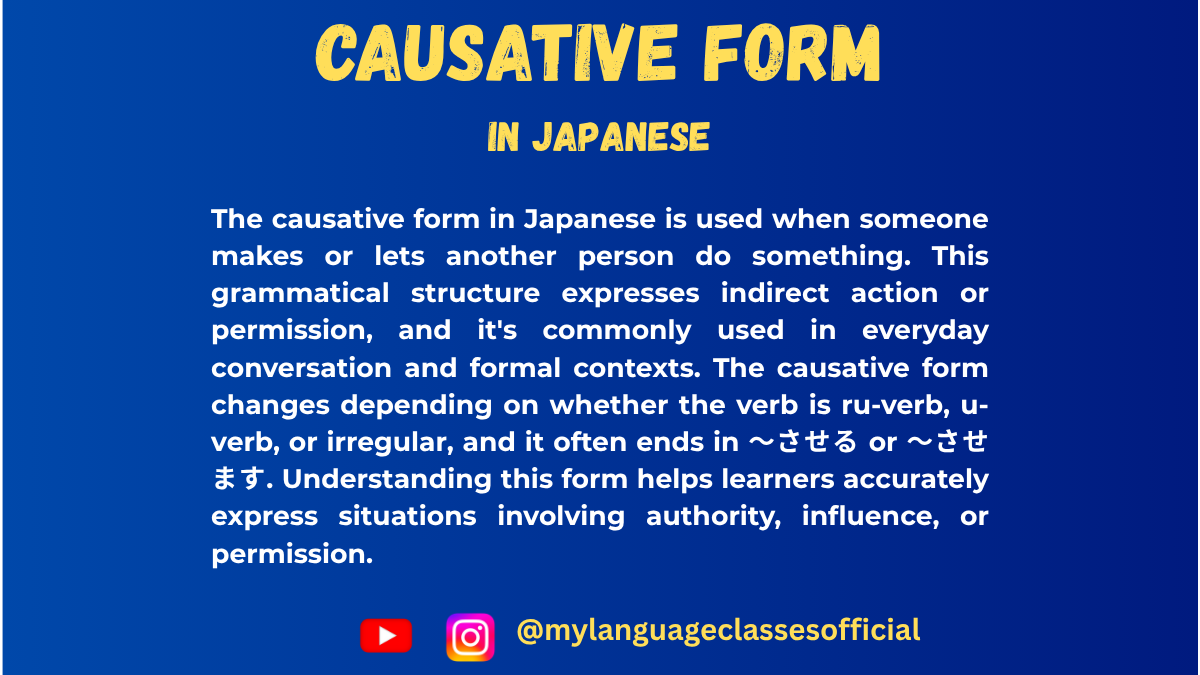Your cart is currently empty!
Tag: dailyprompt-1828
-

Possessive Adjectives in English
Possessive adjectives are essential in English grammar as they help us indicate ownership or possession. They modify nouns to show who something belongs to and are widely used in everyday communication. In this blog post, we will explore possessive adjectives, their usage, examples, and exercises to help you master them.
What Are Possessive Adjectives?
Possessive adjectives are words that show ownership or belonging. They always come before a noun and modify it to indicate possession. The most common possessive adjectives in English are:
- my
- your
- his
- her
- its
- our
- their
These adjectives replace the need for a noun to show possession explicitly.
Usage of Possessive Adjectives
Possessive adjectives are used in various situations:
- Indicating Ownership – Used to show that something belongs to someone.
Example: This is my book. - Talking About Relationships – Used to describe family members, friends, or connections.
Example: His brother is a doctor. - Describing Body Parts – Used instead of definite articles (e.g., the).
Example: She injured her leg. - Referring to Pets and Objects – Used to show ownership of pets or things.
Example: The dog is wagging its tail. - Indicating Group Ownership – Used for plural subjects.
Example: This is our house. - Addressing Someone Formally and Informally – “Your” can be used in both formal and informal contexts.
Example: Your car is parked outside. - Expressing Feelings or Thoughts – Used to describe personal emotions, beliefs, or opinions.
Example: My opinion is different from yours. - Talking About Time and Events – Used when referring to specific times or occasions.
Example: We enjoyed our holiday. - Indicating Professional Roles or Responsibilities – Used for job positions or tasks.
Example: Her manager is very supportive. - Possession in Abstract Concepts – Used for things like names, ideas, or dreams.
Example: His idea was brilliant.
List of Possessive Adjectives with Example Sentences
Possessive Adjective Beginner Level Example Intermediate Level Example My This is my pen. My thoughts are clear now. Your Is this your book? I respect your decision. His His bike is red. I don’t understand his logic. Her Her dress is beautiful. Her dedication to work is impressive. Its The dog wagged its tail. The company changed its policy. Our Our school is big. We must protect our environment. Their Their house is near the park. Their success is well-deserved. More Example Sentences
- She forgot her keys at home.
- This is my favorite song.
- I love your cooking.
- He took his jacket and left.
- The cat licked its paws.
- We had a great time at our wedding.
- They visited their grandparents last summer.
- Please submit your assignments on time.
- He is proud of his achievements.
- The dog followed its owner.
Fill in the Blanks
- Is this ___ book? (your/my)
- He forgot ___ phone at home. (his/its)
- We love spending time with ___ family. (our/their)
- She borrowed ___ pen to write a note. (his/her)
- The cat licked ___ fur after the bath. (its/her)
- They celebrated ___ anniversary last night. (their/our)
- I don’t understand ___ reasoning. (his/your)
- We went to ___ favorite restaurant. (my/our)
- The teacher praised ___ students. (her/his)
- You should respect ___ elders. (their/your)
Answers
- your
- his
- our
- her
- its
- their
- his
- our
- her
- your
Things to Keep in Mind
- Possessive adjectives must be followed by a noun. (e.g., My car is new. NOT My is new.)
- “Its” is not the same as “it’s.” (“Its” shows possession, while “it’s” is a contraction of “it is.”)
- Possessive adjectives do not change based on gender except “his” and “her.”
- Unlike possessive pronouns, possessive adjectives always require a noun. (e.g., This is my book. vs. This book is mine.)
- Possessive adjectives agree with the possessor, not the thing possessed. (e.g., His sister (not Her sister) when referring to a boy’s sister.)
Conclusion
Possessive adjectives play a crucial role in English grammar by indicating ownership and relationships. They are commonly used in everyday communication and are easy to learn with practice. By understanding their usage and applying them in sentences, you can improve your English fluency significantly. Keep practicing with the examples and exercises provided, and soon, possessive adjectives will become second nature to you!
If you enjoyed this lesson, be sure to check out more posts like this on my blog at My Language Classes. Don’t forget to subscribe my YouTube channel and follow me on Instagram for the latest language learning tips and lessons. Leave a comment below to share your thoughts, or ask any questions you have about nouns.
Happy learning! 😊
-

Causative Form of Verbs in Japanese | My Language Classes
Understanding Causative Form in Japanese
The causative form in Japanese is used to express situations where someone makes or allows another person to do something. This grammatical structure is essential for both beginners and intermediate learners as it plays a vital role in daily conversations and formal settings.
Formation of the Causative Form
The causative form in Japanese follows a specific conjugation pattern based on the verb group.
Group 1 (Ichidan Verbs – る-verbs)
- Drop る and add させる
- Example: 食べる → 食べさせる (taberu → tabesaseru) – “to make/let someone eat”
Group 2 (Godan Verbs – う-verbs)
- Change the final う sound to あ and add せる
- Example: 書く → 書かせる (kaku → kakaseru) – “to make/let someone write”
Irregular Verbs
- する → させる
- くる → こさせる
Usage of Causative Form
1. Making Someone Do Something
When the subject forces someone to do something.
- 先生は生徒に本を読ませた。
- Sensei wa seito ni hon o yomaseta.
- “The teacher made the student read the book.”
2. Allowing Someone to Do Something
When the subject permits another person to do something.
- 母は子供にアイスクリームを食べさせた。
- Haha wa kodomo ni aisukurīmu o tabesaseta.
- “The mother let the child eat ice cream.”
3. When Used with Intransitive Verbs
It means “to let someone” do something.
- 友達は私を早く帰らせた。
- Tomodachi wa watashi o hayaku kaeraseta.
- “My friend let me go home early.”
4. Causative-Passive Form (When Someone Is Made to Do Something Unwillingly)
- 先生に宿題をたくさんやらせられた。
- Sensei ni shukudai o takusan yaraserareta.
- “I was made to do a lot of homework by the teacher.”
Situations Where Causative Form Is Used
- Forcing someone to do something
- Giving permission to do something
- Describing workplace instructions
- Formal requests in a business setting
- Parenting and teaching situations
- Expressing feelings of obligation
- Telling someone to act on your behalf
Beginner and Intermediate Level Verbs with Causative Form and Example Sentences
Verb (Dictionary Form) Causative Form Example Sentence 1 Romaji English Example Sentence 2 Romaji English 食べる (taberu) 食べさせる (tabesaseru) 母は私に野菜を食べさせた。 Haha wa watashi ni yasai o tabesaseta. “My mother made me eat vegetables.” 先生は生徒に昼ご飯を食べさせた。 Sensei wa seito ni hirugohan o tabesaseta. “The teacher let the students eat lunch.” 行く (iku) 行かせる (ikaseru) 父は私を学校に行かせた。 Chichi wa watashi o gakkō ni ikaseta. “My father made me go to school.” 先生は生徒を旅行に行かせた。 Sensei wa seito o ryokō ni ikaseta. “The teacher let the students go on a trip.” 書く (kaku) 書かせる (kakaseru) 先生は生徒に作文を書かせた。 Sensei wa seito ni sakubun o kakaseta. “The teacher made the student write an essay.” 彼は弟に手紙を書かせた。 Kare wa otōto ni tegami o kakaseta. “He made his younger brother write a letter.”
More Example Sentences
- 先生は生徒に宿題をやらせた。
- 友達は私にその映画を見させた。
- 母は私に皿を洗わせた。
- 父は私にピアノを弾かせた。
- 会社は社員に報告書を書かせた。
- 医者は患者に薬を飲ませた。
- 先生は学生を立たせた。
- 兄は弟に犬を散歩させた。
- 友達は私に試験の問題を解かせた。
- 父は私に手伝いをさせた。
Fill in the Blanks
- 先生は生徒に本を ___ 。
- 母は子供に野菜を ___ 。
- 友達は私を早く ___ 。
- 父は私に宿題を ___ 。
- 医者は患者に薬を ___ 。
- 先生は生徒に黒板に字を ___ 。
- 社長は部下にレポートを ___ 。
- 兄は弟にピアノを ___ 。
- 友達は私に試験の答えを ___ 。
- 先生は学生を立たせた。
Answers
- 読ませた
- 食べさせた
- 帰らせた
- やらせた
- 飲ませた
- 書かせた
- 書かせた
- 弾かせた
- 解かせた
- 立たせた
Things to Keep in Mind
- The causative form can indicate both “making someone do” and “letting someone do” an action.
- The causative-passive form (e.g., やらせられる) is often used when someone is forced to do something against their will.
- The particle に is used to indicate the person being caused to act.
- Some sentences may sound unnatural if used without context, so always consider the situation.
Conclusion
The causative form in Japanese is essential for expressing permission, coercion, and obligation. Mastering it will help you create more nuanced sentences in conversations and formal settings. Keep practicing with different verbs and contexts, and soon, using the causative form will become second nature!
If you enjoyed this lesson, be sure to check out more posts like this on my blog at My Language Classes. Don’t forget to subscribe my YouTube channel and follow me on Instagram for the latest language learning tips and lessons. Leave a comment below to share your thoughts, or ask any questions you have about nouns.
Happy learning! 😊
- Drop る and add させる
